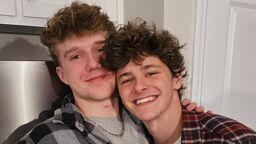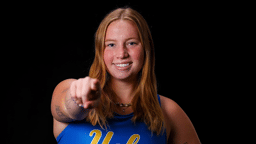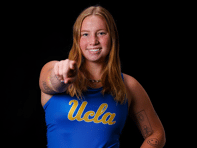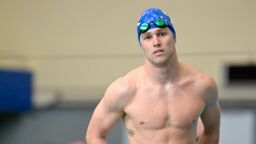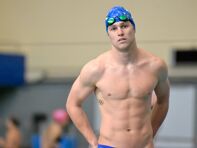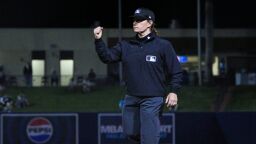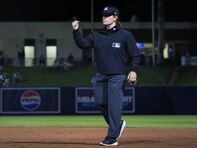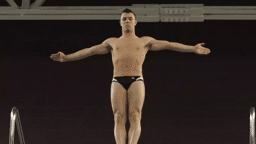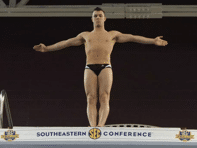Soccer served as a much-needed outlet and escape from grappling with my sexuality.
Earning a starting center midfield position my freshman year at Lake Erie College in Ohio was an extremely proud moment. During the spring season of my freshman year I attempted a more acrobatic soccer move, stretching my leg about head height to block a cross. When I came down to plant on my right foot, my body moved one way and my knee another.
*Pop*
Just like that, I had torn my ACL and meniscus. In the weeks ahead, I faced major surgery and an intensive rehabilitation program. The healing process made me nervous. But what made me even more nervous was having my safety net of soccer stripped away.
Over the next eight months before I was able to play again, I spent an abundance of time on my couch, often letting my thoughts wander. I thought a lot about the life I was living, and how it was always on the terms of others, but never my own.
If you asked anyone who I grew up with what I loved to do the most, I can assure you every answer would have been “play soccer.” I was involved in organized sports from a very young age, but I picked up soccer much quicker than baseball and basketball.
Soccer became my ultimate passion early on, and I am extremely thankful for the sacrifices my parents made that allowed me to play on the top club team in Ohio. I was fortunate enough to win four different state cup championships with this team. I also was able to earn a spot on the Olympic Development Program teams along with participating in college showcases, which ultimately resulted in earning an athletic scholarship to play at the collegiate level.

Although my love and passion for soccer was genuine, it was easy for me to commit so heavily to the athlete lifestyle because it did not allow me a lot of free time to think about my internal conflicts. It took me until my high school years to begin to understand I was different than most boys my age.
Growing up in a Catholic household and Catholic education systems in Northeast Ohio, it was ingrained in me that any feelings or emotions for another man past a normal friend level were sinful. Anything involving the LGBTQ+ community was viewed as abnormal and wrong.
My mind was conditioned to tell my body and heart that the way I was feeling made me a horrible person in God’s eyes. I still vividly remember crying myself to sleep some nights praying that God would take away these “sinful” feelings I was experiencing.
It was not until my sophomore year of college that I started telling a select few close friends that I was gay.
The turning point for my full acceptance was reading Robbie Rogers’ book “Coming Out to Play.”
Although I had pretty much accepted the fact that I was gay and it was not something I could change, the turning point for my full acceptance was reading Robbie Rogers’ book “Coming Out to Play.”
Rogers was the first American professional soccer player to come out as gay while still playing in the MLS. My favorite quote from his book that I deeply connected with is:
“You don’t grow up hating yourself by accident. You don’t learn to lie about your true nature on a whim. You don’t pretend to be straight just for the fun of it. You have to learn and be taught these things, and I was a good student.”
To this day, Robbie Rogers is one of my role models and I am forever grateful for his bravery in being an LGBTQ+ pioneer.

In April 2020, I graduated with my master’s degree from Oakland University in Michigan, where I studied Higher Education Leadership with a concentration in social justice. This program provided me the freedom to research issues within higher education, and I chose to do most of my research projects on the LGBTQ+ student-athlete experience and how collegiate sports teams can foster a more inclusive culture.
One of the biggest takeaways from my research is how important LGBTQ+ representation is in college athletic administration. It’s so important for out, questioning or in-the-closet student-athletes to be able to see LGBTQ+ people in their athletic department who are out, confident, and successful to help them visualize a better future.
Being able to research this topic was just the first step. My next goal became sharing these important takeaways and making a difference in others’ lives. I have been able to facilitate sessions at Oakland and now at Otterbein University in Ohio in an effort to foster a warmer, more inclusive climate within the student population.
For example, the last discussion I held was on “Sexual Orientation and Sports,” and I spent the first 30 minutes sharing my story as a student-athlete, and the impact that hearing homophobic language combined with not knowing any LGBTQ+ people had on my mentality to stay in the closet for so long.
The last 30 minutes, I introduced a case study on a soccer match between the San Diego Loyal, coached by U.S. men’s soccer legend Landon Donovan, vs. Phoenix Rising. In this game, a homophobic slur was targeted against San Diego Loyal player Collin Martin. Instead of just brushing it off, the Loyal decided to forfeit the match and took action for what they believed in —– an inclusive environment for all through sport.

Something I always mention when facilitating discussion is how I believe I could’ve been a better player, student, and person if I felt confident and comfortable enough in myself to come out to my teammates in college.
If I can offer one piece of advice to anyone in the closet or questioning reading this, it would be that things truly do get better, although it may not feel like it at the moment. It won’t be an easy journey either.
Not everyone in your life will fully accept your sexuality, but that’s OK. If you’re lucky enough, everyone will love you the same as before. If you’re like me, the dynamic of your relationships with some people you were close with will change. Life before coming out was in black and white, but after coming out you can finally live your true life in the brightest colors.
Andrew Bucur, 25, is an Undergraduate Admissions Counselor at Otterbein University in Ohio. He was the captain of his soccer team at Lake Erie College and Student-Athlete Advisory Committee vice president. He is looking forward to a long career in higher education where he plans to find ways to work closely with student-athletes in some capacity. He can be reached on Instagram and Twitter or email at [email protected].
Story editor: Jim Buzinski
If you are an out LGBTQ person in sports and want to tell your story, email Jim ([email protected])
Check out our archive of coming out stories.
If you’re an LGBTQ person in sports looking to connect with others in the community, head over to GO! Space to meet and interact with other LGBTQ athletes, or to Equality Coaching Alliance to find other coaches, administrators and other non-athletes in sports.





